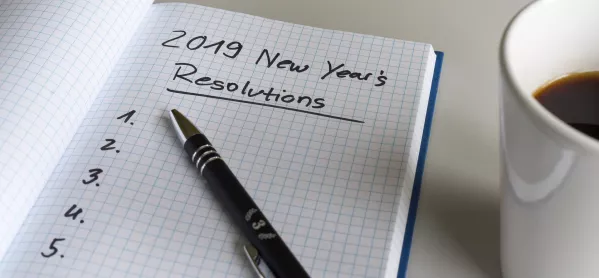Tradition has it that this time of year brings a number of things: late-night parties, new gym memberships, new year’s resolutions and, perhaps most commonly, assemblies about new year’s resolutions.
My issue with resolutions has always been my inability to even begin to keep them. This year, as ever, I know that I’ve eaten too much over Christmas, but I know, too, that I still have a cupboard full of chocolate and biscuits that I can’t bear to part with other than by devouring them over the coming weeks. Any resolutions about dieting will be pure fantasy.
Instead, I propose to offer resolutions for everyone else. "Such arrogance," I hear you cry? Indeed, but given my own failure to keep to my own, I can hardly be expecting you to keep to any I make. But, nevertheless, I will try.
Cut the education jargon
Firstly, can we start with the key stages. When the national curriculum was first written, I can see they needed some vocabulary to describe the various phases that worked for all sorts of schools. For a start, there were several thousand schools in three-tier systems that didn’t fit the standard key stages model at the time.
The silly thing is, in primary schools, the key stages were clearly designed to fit the existing pattern of infant and junior departments.
Yet somehow, over the past 30 years, the terms "infants" and "juniors", which served us well for the best part of the 20th century, ended up being replaced by the administrative labels of the key stages. What a miserable change. Apart from anything else, I can’t be the only person who has occasionally referred to key stage 2 when I meant Year 2, or vice versa.
Nobody would dream of changing the name of an infant school to "Bluebells Key Stage 1 School", so why have we let it happen in primaries? Especially given that schools now all have Reception pupils who are, strictly speaking, not part of key stage 1 but are very much part of the infant department. If for no other reason, perhaps we should bring back the old labels on the grounds of including the whole team.
Still with me? Well, while we’re getting rid of the horrible functional labels, can we ditch “literacy” too? It doesn’t stretch back quite as far as the national curriculum, but it’s clearly an administrative label in the same vein. For those of us who were around for the Literacy Hour, just the sheer memory of the wretched clock ought to be enough for us to abandon that label.
Numeracy seems to have all but disappeared, despite the fact that the new curriculum probably has a clearer focus on numeracy than even the Numeracy strategy. Why is it, then, that "literacy" clings on so? I’ve no objection to including literacy in the curriculum, but surely our curriculum is far greater than the simple ability to read and write. A real English curriculum offers far more excitement, engagement and enjoyment than just the basics.
Now, if I’ve managed to get both of those past you, maybe just one more. Can we stop with the fancy topic names? The Greeks weren’t that groovy, there’s more to Brazil than mardi gras, and, frankly, the Second World War was a horrific business that deserves a little more gravitas than a title like “Bombs and Baddies”.
More to the point, it fools no one. If children aren’t interested to learn about something, an alliterative title isn’t going to change that.
Maybe I won’t win you over on all three, but then, isn’t that what new year’s resolutions are all about: intent more than impact.
Michael Tidd is headteacher at Medmerry Primary School in West Sussex. He tweets @MichaelT1979




